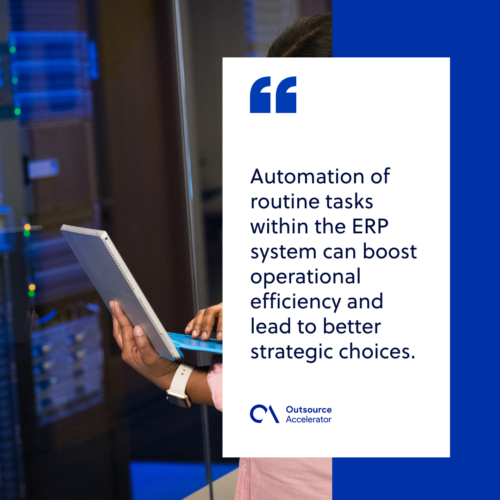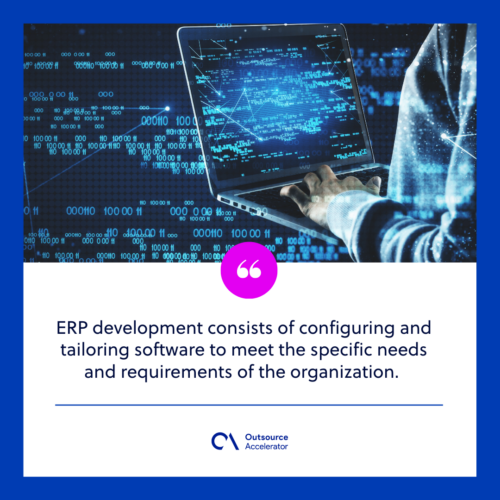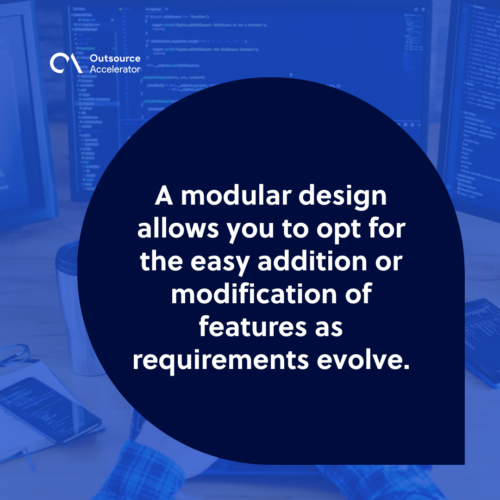The blueprint for effective ERP development

Staying competitive in business requires companies to constantly reevaluate and boost their operational efficiency.
Enter enterprise resource planning (ERP) systems, a comprehensive solution that integrates and streamlines key business processes, data, and workflows. This allows organizations to gain a holistic view of their enterprise.
However, the journey to successful ERP development is a complex one. It requires careful planning, customization, and effective change management to pull off well.
This article digs into the world of ERP development, highlighting key stages, best practices, and future trends to ensure a seamless implementation.
Defining ERP development
ERP development is the process of designing, customizing, implementing, and maintaining an enterprise resource planning (ERP) system.
ERP is a software system that integrates various organizational business processes and departments. It frequently involves finance, human resources, manufacturing, supply chain, and procurement teams.
ERP development consists of configuring and tailoring software to meet the specific needs and requirements of the organization.
ERP development is a complex and iterative process that requires close collaboration between the organization and the developers or consultants. A successful ERP system will streamline business processes and support growth.
6 key stages of ERP development
The key stages of ERP development can vary slightly depending on the source, but generally, there are several common stages involved.
Here are the main stages:
1. Discovery and planning
This stage involves researching and selecting an appropriate ERP system. You’ll need to set up a team, define the project goals, and thoroughly analyze your current processes and systems.
2. Design
In this stage of ERP development, the system’s design is created. This includes defining the following:
- System architecture
- Data structures
- Workflows
- User interfaces
- Integration requirements
3. Development
The development stage involves building and customizing the ERP system based on the defined design.
It involves the following actions:
- Configuring modules
- Programming custom functionalities
- Integrating the system with other software applications or databases
4. Testing
The ERP system undergoes rigorous testing to ensure its functionality, performance, and reliability.
Testing may consist of:
- Unit tests
- Integration tests
- System tests
- User acceptance tests
5. Deployment
The ERP system is rolled out into the production environment during this stage. Data is migrated from existing systems, employees are trained on using the system, and ongoing maintenance and support processes are established.
6. Support and maintenance
Once the ERP system is deployed, ongoing support and maintenance are necessary.
This practice addresses any issues, provides system updates, and ensures the system continues to meet the organization’s evolving needs.
ERP development best practices
To ensure the success of your ERP development project, it’s crucial to adhere to a set of best practices that align with industry standards and proven methodologies.
Here are some key practices to consider:
Comprehensive requirement analysis
Cooperate with key stakeholders to thoroughly understand your organization’s specific needs, processes, and pain points.
Document clear and detailed requirements to serve as a foundation for the development process.
Scalable and flexible design
Design the ERP system with scalability and flexibility in mind to accommodate future growth amid changing business conditions.
A modular design allows you to opt for the easy addition or modification of features as requirements evolve.
Cross-functional collaboration
Establish a cross-functional development team that includes IT, business, and end-user experts. You must also foster open communication channels to bridge the gap between technical and business aspects.
Clear project planning
To mitigate risks, develop a detailed project plan outlining milestones, timelines, and resource allocation. It should define roles and responsibilities within the development team to avoid confusion.
Agile development methodology
Embrace an Agile or iterative development approach to promote flexibility and adaptability.
This involves breaking the project into smaller, manageable sprints to achieve incremental progress. You may also need to review and adjust goals along the way.
Data security and privacy
Implement sturdy security measures to protect important data from breaches and illegal access. Ensure to conduct thorough security testing regularly.
Comply with industry regulations and data protection standards relevant to your business.
Thorough testing and quality assurance
Perform rigorous testing, including conducting:
- Functional testing
- Integration testing
- Performance testing
- User acceptance testing
Doing this at every stage of ERP development lets you identify and rectify issues early to ensure the ERP system functions well.
User training and change management
Develop change management strategies to minimize resistance and promote user acceptance. Provide comprehensive training programs to aid in this.
Regular maintenance and updates
Establish a maintenance plan to address bug fixes, updates, and system enhancements. Stay updated with technology trends and evolving business needs to keep the ERP system relevant.
Continuous improvement
Foster a culture of continuous improvement by collecting feedback and analyzing system performance. You can also review key performance indicators (KPIs) to measure the ERP system’s impact.
Future trends in ERP development
ERP systems have come a long way, transforming the way businesses manage their operations and data.
As technology advances at an unprecedented pace, ERP development is poised to embrace several exciting trends that redefine how organizations operate and thrive.
Here are the key future trends to watch out for:
Cloud-based ERP solutions
Cloud computing is becoming the norm, and ERP systems are following suit. Cloud-based ERP development offers enhanced accessibility, scalability, and cost-efficiency.
Companies can access their ERP systems from anywhere, ensuring seamless remote collaboration.
AI and ML integration
AI and ML are being integrated into ERP systems for predictive analytics and intelligent decision-making. These technologies enable businesses to gain insights from vast amounts of data.
Automation of routine tasks within the ERP system can boost operational efficiency and lead to better strategic choices.

IoT connectivity
IoT devices generate massive amounts of data. Integrating them into ERP development can provide valuable insight.
ERP systems can monitor and analyze data from connected devices, enhancing supply chain visibility, maintenance, and asset tracking.
Enhanced user experience (UX)
ERP development focuses on improving the user experience to drive adoption and productivity.
Intuitive interfaces, personalization options, and mobile-responsive designs are becoming standard. UX enhancements like these can be integrated into ERP to drive adoption and productivity.
Sustainability and ESG considerations
Environmental, social, and governance (ESG) considerations are gaining prominence in business strategies.
ERP development can incorporate ESG metrics, enabling organizations to effectively track and manage their sustainability efforts. Reporting on ESG performance in the ERP system contributes to responsible business practices.









 Independent
Independent




